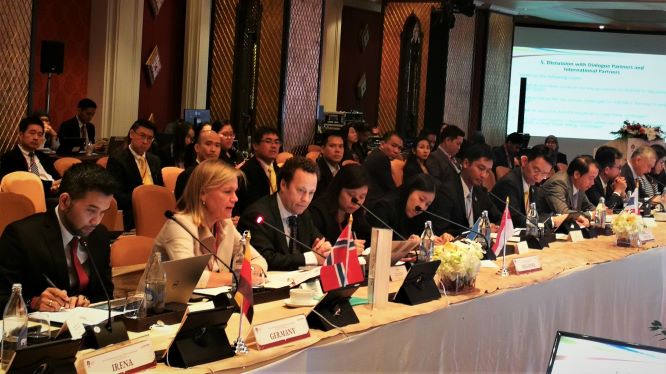Bangkok, 27 June 2019
Bangkok, Thailand – The 37th Senior Official Meeting on Energy (SOME) and its associated meetings were held in Bangkok, Thailand on 24-27 June 2019 with the main purpose to strengthen cooperation within the ASEAN Member States (AMS) on tackling the energy challenges.
ASEAN Plan of Action for Energy Cooperation (APAEC) 2016-2025 is a regional blueprint for the energy sector, holds an essential role in shaping the sustainability of the Association of Southeast Asian Nations (ASEAN) energy landscape.
Moving towards the end of APAEC Phase I (2016-2020), the APAEC Drafting Committee (ADC) is in the process of preparing the APAEC Phase II (2021-2025). Furthermore, the ADC recognizes that the inputs from the APAEC’s Dialogue Partners (DPs) and International Organisation (IOs) are crucial to address the ASEAN’s energy challenges.
Therefore, the 3rd ADC Meeting, which was held in conjunction with the 37th SOME, has invited the DPs and IOs of APAEC to discuss on the energy challenges and solutions for the ASEAN.
The Ambassador H.E. Ms. Kjersti Rødsmoen and Professor Dr. Indra Øverland, from the Royal Norwegian Embassy and the Norwegian Institute of International Affairs (NUPI) respectively, were invited and had attended the 3rd ADC meeting to share their views.
The Norwegian success stories such as the rapid increase in the electric vehicles (EVs) market and the recent plan on banning the world’s largest sovereign wealth fund from coal investments while opening it up for renewable energy infrastructure assets are among the strong examples of moving towards a decarbonization future.
 The 37th Senior Official Meeting on Energy (SOME)
The 37th Senior Official Meeting on Energy (SOME)
Other DPs and IOs who have also attended the meeting were the International Energy Agency (IEA), International Renewable Energy Agency (IRENA), Deutsche Gesellschaft für Internationale Zusammenarbeit (GIZ), and delegates from China, Japan, Republic of Korea, Australia, Russia, and the United States of America.
The DPs and IOs recognized the potential and the importance of future cooperation with the ASEAN in addressing the energy challenges. Capacity building, R&D in technology, energy diversification, regional grid interconnection, accelerating renewable energy, enhancing the energy efficiency, and the climate change impacts on energy supply are among the common aspects that were highlighted by the DPs and IOs. (MM/HYC)
(Photo credit: ACE)